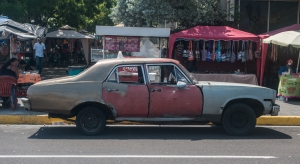Chavismo to Bring the Dynamism of the Home Rental Market to Used Cars

Coming soon to TuCarro.com
Own a car? Want a car? Be very, very afraid: the government’s proposed Used Car Law could well mean the end of legal market for used cars in Venezuela, crippling one of the most popular means of shielding savings against the ravages of inflation at the same time.
One thing the government is right about: Venezuela’s car market is bizarrely distorted. With new car prices carefully controlled, import dollars strictly limited, and demand for wheels way outstripping supply, Venezuela must be one of the only places in the world where cars raise in value the second they move off the lot. With people forced to turned to fix assets to protect the value of their savings, waiting lists for new cars have grown notoriously long. These days, new cars are just another arbitrage opportunity; a steel-rubber-and-glass version of a CADIVI dollar.
The government’s plan to deal with it – mandating notary publics to ensure that used cars sell for no more than 90% of their price when new – is the public policy equivalent of swatting a fly off your nose with a sledgehammer.
The outcomes are entirely predictable: the (legal) used car market is going to seize up completely. And you know how the saying goes: if you outlaw used car trading, only outlaws will trade cars.
What grabs me about this is chavismo’s iron-clad commitment to policies that have failed, clearly failed, visibly failed, publicly failed, failed beyond any possibility of arguing that they haven’t failed. Because chavismo has already tried this form of regulation once, in the home rental market, with an outcome that’s out in the open for all to see. In Venezuela, today, there is no legal rental market for houses and apartments. It has simply ceased to exist, because legislation has tipped incentives so wildly against the interests of one of the parties to the transaction as to shove them out of the market altogether.
Mutatis mutandi, you could tell pretty much the same story about butter, toilet paper, parking spots, wheat flour, sanitary pads, chemotherapy drugs…and on and on and on. Venezuela is drowning in a sea of evidence that this policy response only makes life harder for everybody.
Yet, 14 and a half years into this charade, the principled refusal to see what’s under their noses has become the hallmark of chavismo’s policy-making practice. Every regulation-introduced distortion is fought with a further distortion-introducing regulation, on and on, ad infinitum. The refusal to consider the real world effects of ideological rigidity is now baked into the regime’s identity.
Caracas Chronicles is 100% reader-supported.
We’ve been able to hang on for 22 years in one of the craziest media landscapes in the world. We’ve seen different media outlets in Venezuela (and abroad) closing shop, something we’re looking to avoid at all costs. Your collaboration goes a long way in helping us weather the storm.
Donate




